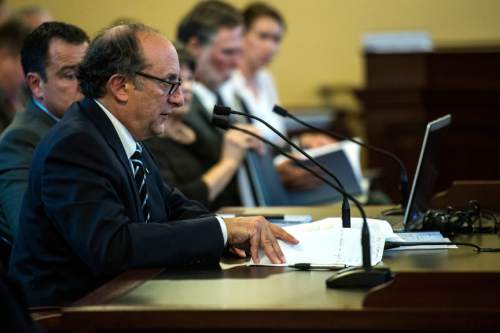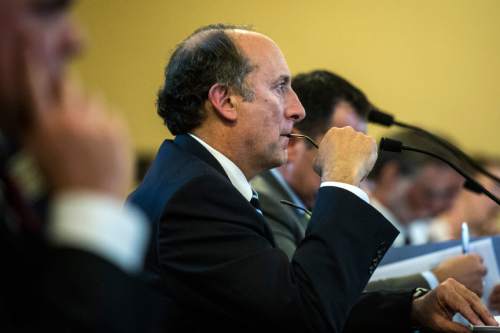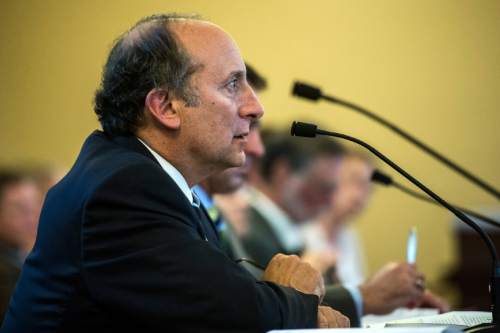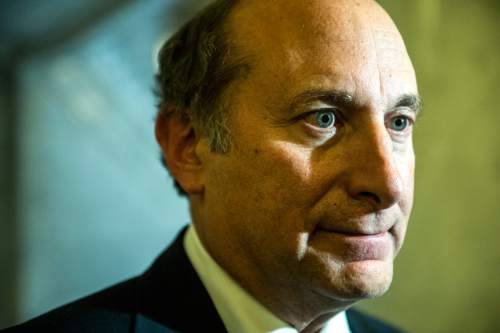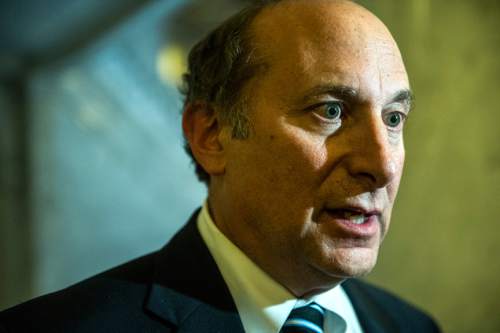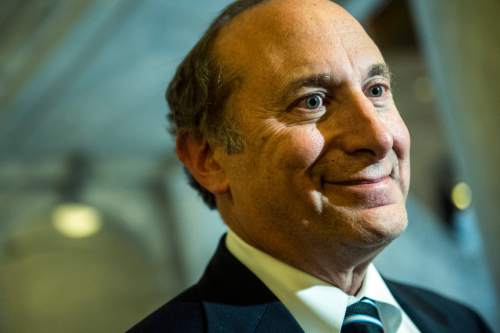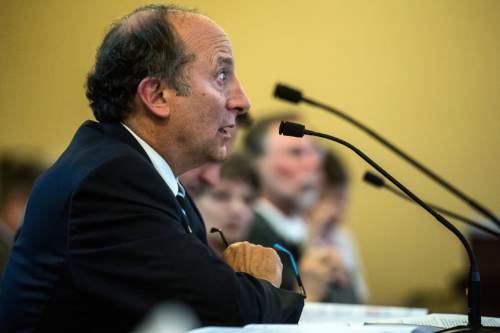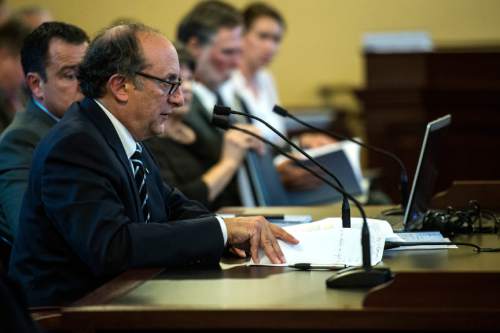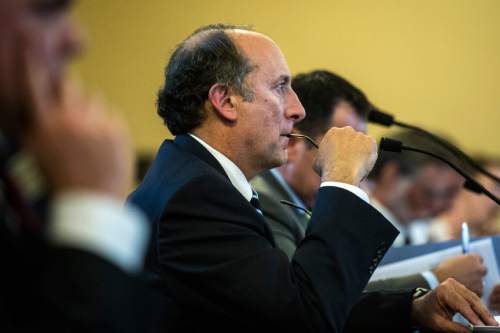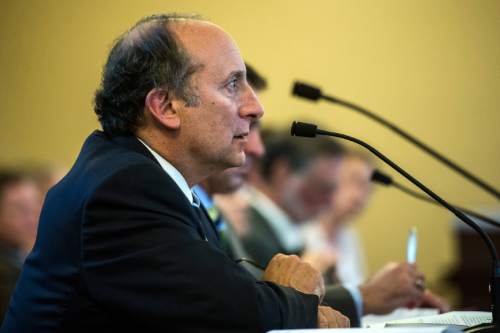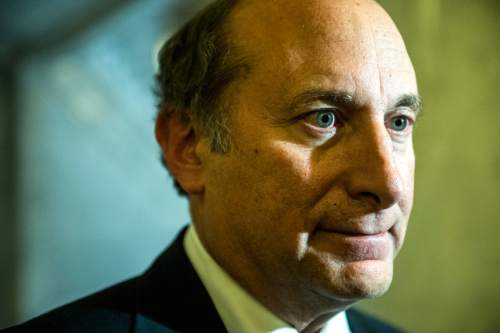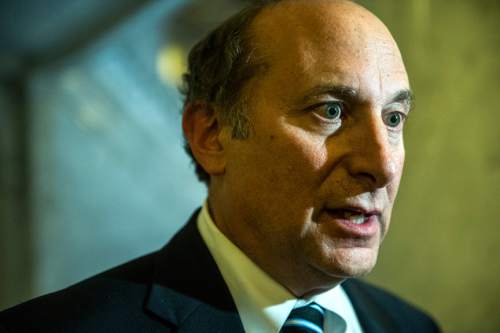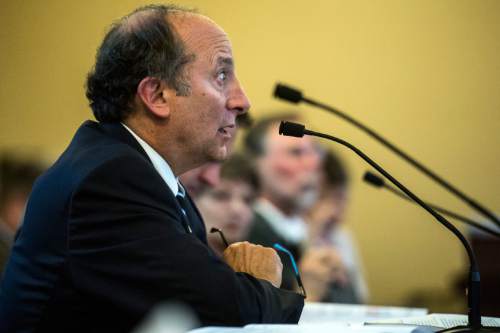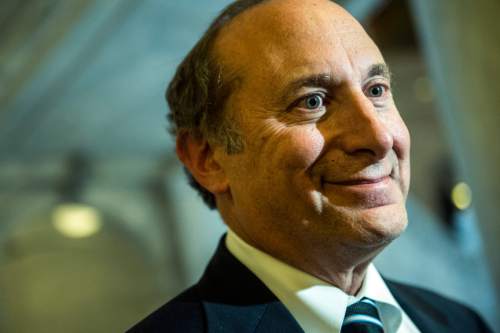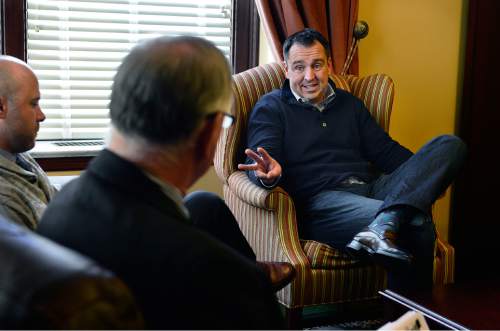This is an archived article that was published on sltrib.com in 2015, and information in the article may be outdated. It is provided only for personal research purposes and may not be reprinted.
He traveled out of state for his job 42 times in 28 months.
Internationally, he jetted twice to Switzerland, once to Germany and another time to Montreal.
In the United States, he made eight trips to Washington, D.C., six to Denver, three each to Las Vegas and Los Angeles, along with treks to Palm Springs, New Orleans, Portland, Seattle, New York City, Philadelphia, Boston, Houston and Atlanta, among others.
He isn't an airline pilot, professional golfer or tour guide. He is Michael Allegra, president and CEO of the Utah Transit Authority.
UTA said it did not have data showing precisely how much these trips cost, in responding to an open-records request. But the agency said it spent $814,000 on travel for all staff and guests between July 1, 2012, and Oct. 31, 2014.
UTA travel has been controversial, with critics complaining that the price tag, along with high executive pay and bonuses, comes at the same time the agency says it cannot afford major expansion of late-night and weekend transit service.
UTA contends travel saves money by exploring transit innovations in other cities and at conferences, and by working with federal officials for grants.
—
Less travel • UTA spent an average of $29,071 a month on travel during the 28 months running through last October, down from $36,000 a month when The Salt Lake Tribune last examined the agency's travel over a similar stretch of time ending in mid-2012.
Allegra said through a spokesman that he was too busy for an interview on the topic. But he provided a written statement identifying a main reason for reduced spending on travel.
"This is in large part," he wrote, "due to the end of responsibilities bestowed by the UTA board on former CEO John Inglish to study relevant issues and advance UTA's participation nationally and internationally."
When The Tribune looked at UTA travel in 2012, Inglish had taken trips in the previous 2½ years to Belgium, China, France, Germany, Hong Kong, Italy, Mexico, Spain (twice), Switzerland, Sweden, the United Arab Emirates and 17 U.S. cities.
As Inglish, the former UTA general manager, was approaching retirement and Allegra (then Inglish's No. 2) was offered other jobs nationally, the UTA board cut a deal to promote Allegra into Inglish's job and for two years gave Inglish the mostly advisory job of CEO at an annual salary of $364,406.
Inglish represented UTA at many national and international groups and conferences before retiring in April 2012.
Another reason for less travel — according to Allegra and Greg Hughes, the former UTA board chairman who is the new Utah House speaker — is a policy change last year requiring board approval in a public meeting for international travel.
—
Contrasts • UTA's travel shows stark contrasts with the state's other big transportation agency, the Utah Department of Transportation.
UDOT spends about half as much as UTA on travel, around $16,000 a month during the past 2½ years.
UDOT quickly provided a list of out-of-state travel by employees, including the costs, destination and purpose. UTA said in response to an open-records request that it could not provide documents with such breakdowns.
It pointed to the state's transparency website, which lists the expenses for each UTA department, but does not easily provide information on trips by individual employees, destinations or purposes.
Analysis of data from the transparency website did show, however, the UTA general manager's office spent $74,312 on lodging, transportation and conference and training fees between July 1, 2012, and July 31, 2014. That's $2,972 a month.
Meanwhile, UDOT spent $6,506 for travel by Executive Director Carlos Braceras from when he was promoted to that post in May 2013 through 2014. That's about $325 a month for a total of 15 domestic trips.
At The Tribune's request, UTA compiled a list of travel by several agency officials — those in the general manager's office, the chief communication officer's office, board members and UTA-funded trips for other elected officials. That showed travel by individuals and purposes for trips in those offices.
But that list missed at least one key trip — a controversial one in which several UTA officials, including board member Chris Bleak, went to Switzerland a day after UTA told legislators that a 66 percent hike in sales tax for transit would be needed to complete transit projects included in the state's 2040 transportation plan.
UTA spokesman Remi Barron said in an email that "staff members pulling together the information for the board thought Greg Hughes was the only board member who went on that trip. Hughes paid for himself, so the trip was not listed." He said the list is otherwise complete.
—
Purposes • UTA and UDOT list similar philosophies for travel, even if the amounts spent and tracking are different.
UDOT spokesman John Gleason said any out-of-state travel is supposed "to develop ideas which will help improve Utah's transportation system."
Many innovations came from out-of-state conferences, he said. "These include the diverging-diamond interchange, accelerated bridge construction and even innovative contracting methods like design-build that drastically reduce the length of construction projects."
Allegra wrote that travel is important because "transit is constantly evolving and UTA staff keeps abreast of best practices and new innovations by participating on industry committees, conferences and workshops."
He added that travel to Washington, D.C., and other places to work with federal and congressional leaders helps UTA pursue "competitive federal funding and grant opportunities."
Hughes, the former UTA board chairman, also says the agency sometimes needs to take locally elected leaders to see how transit affects other areas and could impact their own. He said that is one reason travel by UTA may be higher than UDOT.
He noted that UTA has no power to condemn land on its own and must work with cities to do that on its behalf for transit projects. So, in July 2012, for example, UTA took the mayors and two city council members each from Ogden and Herriman to Portland, Ore., to look at transit-related projects similar to some proposed here.
"Sometimes being on the ground, asking their peers" how such projects have worked out "is more informative," Hughes said. "It communicates better than the PowerPoint presentation that you might hear."
Hughes took 13 trips funded by UTA in the 2½ years before he left its board, including one to Switzerland to look at mountain-transportation systems. He said that was so informative that he later returned, paying for the trip out of his own pocket, to show other legislators and officials potential projects for Utah.
"But when you can see it, you can touch it … and you see a transit system you haven't been familiar with and it works," Hughes said, "there's something real about that."
Hughes adds, "These aren't leisurely trips. Some of them become so demanding it even limits who can go."
—
Criticism • UTA's travel has been controversial, along with its high pay and bonuses for executives. (Allegra, for example, received a 2013 compensation package of $402,187, including a $30,000 bonus. In contrast, UDOT Executive Director Braceras received $221,433 and no bonus.)
"The high salaries, bonuses and these trips concern us," said Christopher Stout, president of the Utah Transit Riders Union, which was formed to push for expanded bus service, especially late at night and on weekends.
"They say they cannot afford it [service expansion]," Stout said, "yet they can afford other things that do not increase service."
He said the travel seems excessive for an agency that ranks a top priority as expanding bus service. "That's what they said back in 2013, then they all jumped on an airplane and flew to Switzerland to see the cog railways."
Stout adds, "If they really, truly want to expand bus service and service in general, instead of taking these trips to various countries and states, they really need to go stand on a corner and wait for a bus. ... That's how they're truly going to find out what's wrong with their system."
Such criticism comes as legislators are discussing whether to allow voters to consider increasing local sales taxes for UTA. Some say concern about UTA pay and travel killed similar legislation last year.
Hughes says he does not want to see worthwhile travel impeded "because of perception, but the onus is on UTA to communicate why those things are important."
In politics, perception is reality, he said, so you need "to communicate the important public purpose for what you are doing."
Along that line, Allegra wrote that travel "has helped UTA become one of the most successful and top-performing transit agencies in this country, building 140 miles of rail in 14 years ... and operating one of the lowest cost-per-miles systems in the country."
He added, "We are experiencing the highest ridership in our history, and recently received the APTA [American Public Transportation Association] Outstanding Public Transportation System award for the fourth time."
UTA's delegation to accept that award last October in Houston included no fewer than seven executives and board members.
Email: ldavidson@sltrib.com Twitter: @LeeHDavidson —
42 trips in 28 months
Places visited by UTA President and CEO Michael Allegra in recent 28-month period:
International • Switzerland (twice), Germany, Montreal.
National • Atlanta, Boston, Chicago, Denver (six times), Houston, Indianapolis, Kansas City, Las Vegas (three times), Los Angeles (three times), New Orleans, New York City, Oakland, Palm Springs, Philadelphia, Phoenix (twice), Portland, San Diego, San Francisco, Seattle (twice), and Washington, D.C. (eight times).


